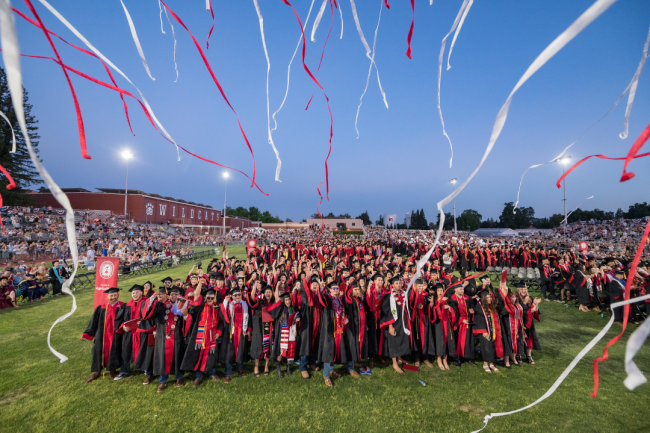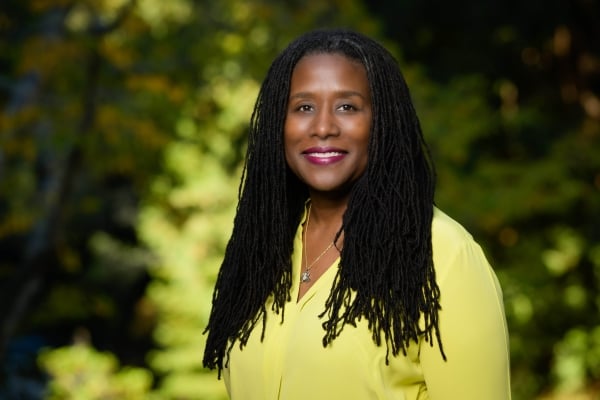You have /5 articles left.
Sign up for a free account or log in.

More than 100,000 students graduate annually from the CSU, and Jennifer Baszile, inaugural associate vice chancellor for student success and inclusive excellence, works to support them at a systemwide level.
Jason Halley/Chico State
In May, Jennifer Baszile became California State University’s first associate vice president for student success and inclusive excellence. In this role, Baszile is responsible for CSU’s student success analytic tools; certificate program in Student Success Analytics; student success partnerships, research and grants; early assessment; and academic preparation efforts. She also serves as the primary liaison with the Academic Senate of the CSU system.

Baszile spoke with Inside Higher Ed about her previous work experience, the role of data in providing equitable access to students and her goals for the upcoming year.
Q: What led you to a career in higher education?
A: From a personal perspective, I was actually a college student sitting in a class and had a transformative educational experience. Literally, in a day, I decided that any discipline, any experience that could help me answer a question that I’ve been asking for so long in my life, I wanted to do it for the rest of my life.
Later on down the line … I was teaching early American history and really loved it—love the research, love the writing, love the teaching. But I kept finding that students were coming to me with questions not about the assigned work and about the classroom experience. They were coming to me with what we now know as student success-related questions. I really came to understand that there was even more to the college experience and to the student experience … than what was happening inside the confines of the classroom.
Q: Throughout your career you have worked in student-facing roles. How has your career trajectory led you to this new position?
A: I think part of what fuels my passion for it is that I started off my career in higher education, obviously, first as a student, but then I started as a faculty member. I really understand student success in the context of institutional success. And since I’ve worn a number of different kinds of hats—I’ve been an administrator, I’ve been a program [deliverer], I’ve been a faculty member, I’ve been an undergraduate adviser, I’ve been a graduate adviser—I have this broad, multidimensional perspective on what student success actually is and who are the stakeholders who need to be engaged in order to really get the momentum that everybody needs and that everybody wants in order to move forward.
I’ve taught at flagship public institutions, I’ve taught at R-1s, I have taught at a private Ivy League institution, I have worked in a small liberal arts college. Most recently, I have been part of two systems, the UC and now the CSU. All of those different perspectives, I think, have really informed my approach to student success. But it continues to confirm the urgency of student success in higher education for me.
Q: Why do you say there’s an urgency for student success?
A: In the most basic terms, almost all of the mission-critical issues in higher education right now converge in the conversation around student success. If that is the creation of new knowledge, and how the creation of new knowledge actually unfolds in the learning experience, there’s a part of that that has to do with student success. If you’re talking about student engagement and well-being and the co-curricular experience, that has to do with student success. If you’re talking about the learning environment, and what students are learning and how they’re able to reflect what they’re learning, through all kinds of evaluation and assessment—whether it’s a test or it’s an internship or another kind of super-important experience—that is part of student success. Then the reflection of the totality of the skills and experiences that students develop through the university experience, once they get out in the world, that’s also part of what student success is about.
And that is really, I think, so much about the value proposition of higher education right now, no matter how you slice it. Whether you say student success is a pie or it’s a cake or whatever analogy you want to draw with it. I think that there is so much that is so powerfully reflected in what we evaluate about institutional effectiveness. To borrow language from minority-serving, Hispanic-serving institution frameworks about serving, this serving is reflected very much in how we talk about student success.
Q: The California State system is known for its data-based work in student success. What role does data play into your new position?
A: Even before I came to the CSU, I was an admirer of the work of the CSU with regard to data, because of the degree of curiosity that the system has reflected that I think is actually really bold and super exciting.
Since I’ve been here, the most important thing that I have learned is that there is really broad understanding that behind every data point is the student experience. These are not just numbers. Faculty, student leaders, administrators—they really do connect the numbers with student experiences, and with experiences over all.
Part of the reason why we’re so data-focused, and why it’s so core to the mission, is because of the role of social and economic mobility in the access mission of the CSU. There is really a sense of urgency about, “How [do] we get this right, and how we are making an impact for communities for students and for the state?” And the only way that you can do this, at that scale—we educate nearly a half a million students—the only way you can do this is to really be laser-focused on the data and to really understand what it is telling us.
Q: What are your goals in the first year?
A: One goal is to always lead with listening. It sounds a little fluffy, but in this system where there has been so much dynamic work, it’s super important, because there have been people who have literally dedicated their careers to this work. To really understand what has been working is going to be super important.
The second thing is to deepen the opportunities for collaboration, because of the nature of the work, collaboration is absolutely central. That’s not like lip-service collaboration. Deep collaboration is super important.
And the third specific thing is to continue to work with colleagues across the system for us to develop the vision for what is next after GI [Graduation Initiative] 2025. We are entering the sunset of this really important initiative—it’s not over yet, we’re not saying that we’re finished. But to really think about where the system goes after that is going to be sort of the defining challenge of the next year or two.
Q: Where do you see the biggest challenges in your role?
A: One of the biggest challenges for the role, and one of the things I actually learned from my previous experience at [University of California] Santa Cruz, is any time you talk about system-level work, the challenges really grow, because the institutions are so different. What works for a research-intensive California State University in a metropolitan environment is not necessarily what’s going to work for a California State University in a more remote part of the state with a smaller population facing enrollment challenges, right? It’s really figuring out how to serve the institutional specificity and to synergize, and to create that shared impact across the system.
The other thing that’s a challenge in student success work is [that] the whole conversation about rewards, measurement and performance really become important in student success work. Because part of what the CSU has already demonstrated is the bravery to ask the question and to measure. But once we measure—even if we fall short of what we hoped would be a target—we don’t want to punish people for the fact that they had the courage to ask the question and make the evaluation. We have to really be intentional and creative in the way that we have that conversation to support the outcomes we want, and that we continue to broaden investment and engagement with the priority of student success.
The last thing I will say is obviously the conversation around student well-being, whether it’s basic needs or mental health. That continues to be a super, super-important conversation in the context of student success.
Seeking stories from campus leaders, faculty members and staff for our Student Success focus. Share here.




